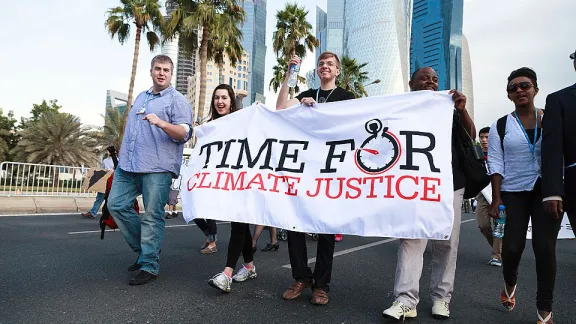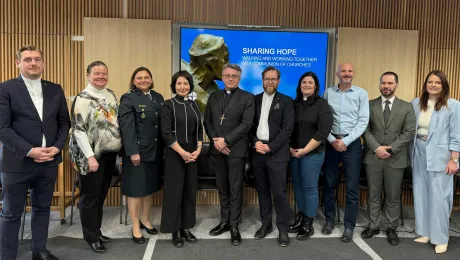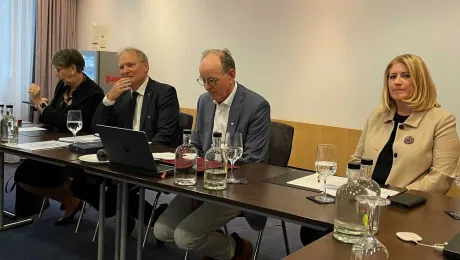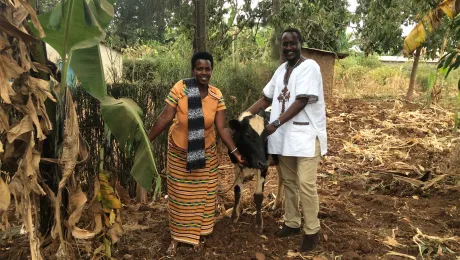
Lutheran youth and ecumenical partners joined hundreds of demonstrators on 1 December for a climate march in Qatar to demand action at the COP 18 summit. © LWF/Sidney Traynham
LWF Delegation: Committed to Fight to Save ‘Our Future’
Two weeks of negotiations at the latest global climate summit in Doha, Qatar failed to produce valuable outcomes for the poor and vulnerable communities that are likely to be most affected by climate change, delegates representing The Lutheran World Federation (LWF) say.
Despite the lack of progress, the LWF delegation members attending as observers to the 18th session of the Conference of the Parties (COP 18) to the United Nations Framework Convention on Climate Change (UNFCCC) remain hopeful. The nine young men and women worked during the 26 November – 7 December summit to foster interfaith dialogue and engaged in joint advocacy with the ACT Alliance and World Council of Churches.
“If rich governments are not willing to take the necessary action on climate change, then we will have to,” says Warime Guti of Papua New Guinea. “It’s our future and we have to fight to save it.” The group believes that the need for citizen and church action is even greater now and each delegation member has committed to implement a climate change initiative in their home country accompanied by the LWF.
The delegation represented LWF member churches in Argentina, Brazil, Canada, Germany, India, Madagascar, Norway, Papua New Guinea and Poland.
The Church Must Speak Out
At the conclusion of the meetings at Doha, the group explored ways in which the LWF and its member churches can be more actively engaged in the issue of climate change. “The church still has an important voice and vital role as a global conscience for our communities and countries,” they noted. “It is up to us—as the church—to speak out, advocate, lobby and influence the public dialogue in each of our contexts so that people care about this issue and compel our governments to act.”
While governments did not commit to significant new carbon emission reductions at the Doha summit, there were some minimal gains to help facilitate transition to the next round of talks. Countries agreed to the future establishment of a funding mechanism to compensate for loss and damage that result from climate change-related disasters in developing countries, but many analysts suggest that the ambition for such a system remains very low.
In addition, several countries increased pledges or announced funding for green climate initiatives and adaptation assistance, but overall financial commitment remains low and the path to reaching the previously set global goal of USD 100 billion per year for developing countries by 2020 is unclear.
With One Voice
The LWF representatives said their participation in the Doha meetings had broadened their insights on the need to develop and update holistic climate change strategies; engage with civil society in joint advocacy; and pursue theological reflection.
One of the key initiatives that they led was an international interfaith meeting of youth from different religious backgrounds to begin networking and planning for the COP 19 climate summit in Poland.
“Small things can produce big changes. I am convinced of this, “says Iwona Baraniec, from Poland, who is also an LWF Council member. “I saw that small communities can even influence the negotiations.” She plans to stay engaged in the interfaith coordination and to help her church prepare as her country hosts the 2013 summit.
“I want to see that all churches and communities work on this one topic of climate change,” says Baraniec. “We have many differences among us—Roman Catholics, Protestants, Jews and Muslims—but we can have one voice.”
Leif Christian Andersen sees the topic of climate change as an opportunity, and plans to pursue an interfaith perspective as he returns home to Norway. “It is frustrating that the negotiations move so slowly, but this means that we have to work even harder back at home,” he said.
He is particularly concerned about the youth in Norway, who, he believes have lost interest in climate change. “There is not the same urgency any more. People say, ‘Oh, maybe it’s not human-made’,” says Andersen, who is a nurse and local politician. He adds that it is particularly difficult in his context, because of the country’s financial dependence on the oil and gas industry.
“Often all that we hear in the media is the conflict between religions,” notes Andersen. “I hope that by starting a new conversation, this could be an opportunity for the media to profile the good work that people of faith can do together.”
Ready to Work
Guti, a member of the LWF Council, believes that Lutherans, who comprise nearly 20 percent of Papua New Guinea’s population, can do more by organizing and speaking out on the issue of climate change “so that the government can better represent the people.”
“If the church is silent, it does not have power,” says Guti, information technology coordinator at the Evangelical Lutheran Church of Papua New Guinea. “We are supposed to be the voice of the voiceless.”
His two-fold plan includes organizing a forum to collaboratively look further at climate change as a cross-cutting issue throughout the church’s work in areas such as food security, social justice, health and education. Congregations’ involvement is crucial, and he says this could start with practical actions such as collecting plastic litter and collective initiatives to reduce pollution.
Nahún Stürtz from Argentina says the conference was particularly meaningful despite the lack of action from governments.
“We cannot negotiate about acting or not acting,” he said. “Climate change is happening. We have to do something. And I want to get down to work.”
LWF General Secretary Rev. Martin Junge commended the delegation for their active participation in the COP 18 events at Doha. “Their engagement, interactions and experience at the summit constitute a significant contribution to LWF’s commitment to addressing climate change,” he said.
“We will look into ways of bringing their reflections and recommendations to the attention of the LWF Council for further action,” he added.
(By Sidney Traynham, LWF communications coordinator at the Doha summit)
The updates from the delegation can be found online:
LWF Youth Blog: http://www.lwfyouth.org
Facebook: http://www.facebook.com/LWFYouth
Twitter: http://www.twitter.com/LWFYouth


